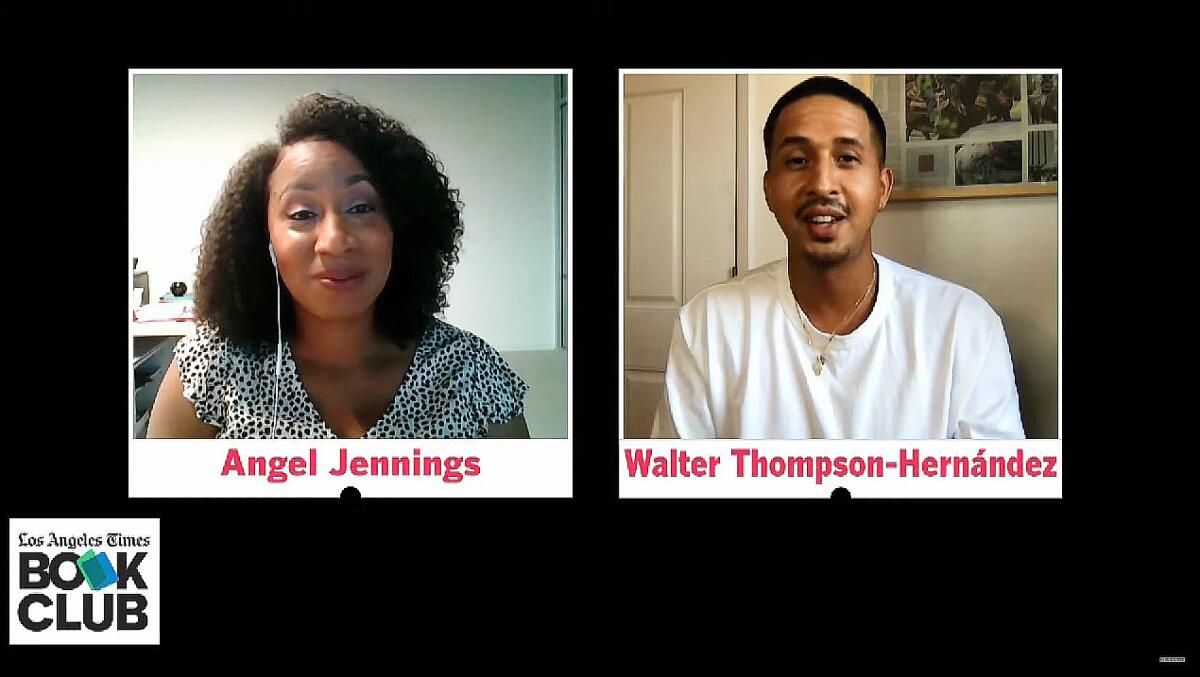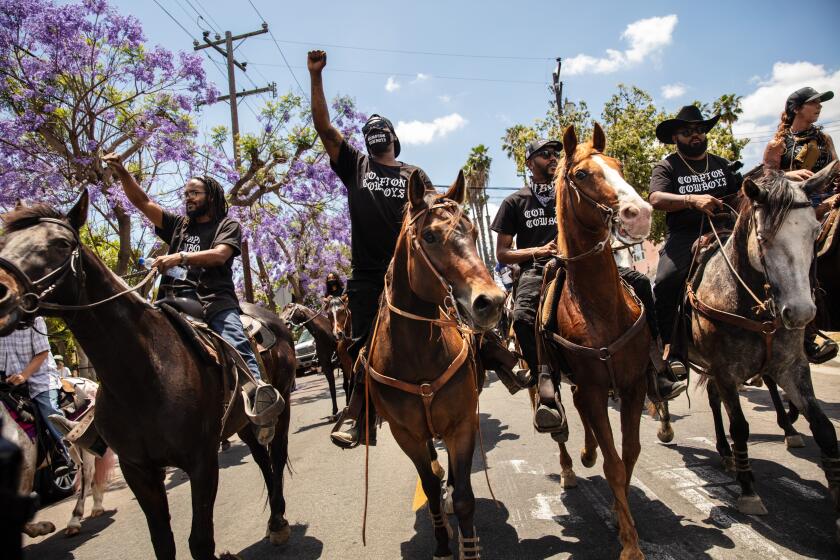5 things to know about Walter Thompson-Hernández and ‘The Compton Cowboys’

- Share via
Walter Thompson-Hernández joined the Los Angeles Times Book Club for a virtual meet-up Wednesday night to talk about the current civil unrest, survival and his debut book, “The Compton Cowboys.”
The book introduces nine Black men and one woman who learned to ride horses as kids in what was then called the Compton Jr. Posse. The riding and gang-prevention program began at Richland Farms in the mid-1980s. Members adopted the credo: “Streets raised us. Horses saved us.”
Times Metro reporter Angel Jennings joined Thompson-Hernández to discuss identity, how the book came to be and the author’s upcoming projects.

Here are five highlights from the book club discussion.The story’s relevance today
Following the killing of George Floyd and the civil unrest that ensued, many of the book’s themes feel especially timely. Thompson-Hernández spent nearly every day with the cowboys in Compton while researching his book. When the recent protests erupted, he wasn’t entirely surprised. “Spending a year and a half with these men and women in Compton, I really was able to see how they experience life, how the police treats them, the tragedies in their life and also the joyful moments too,” he said.
Thompson-Hernández said he hopes people see the book as being more than just about cowboys and cowgirls. “This is really a book about race in America. About what it means to be a Black man living in America and the really creative ways that Black folks have been forced to find ways to survive.”
Being homesick played a part
After writing about subcultures around the world for the New York Times, Thompson-Hernández felt homesick. “I was home for a week and a half and I was like, ‘Man, how do I stay home longer?” He thought about a story he could do in his hometown of Los Angeles. Like many millennials, he searched through Instagram for ideas. He rediscovered the Compton Cowboys, a group he knew from his childhood growing up in nearby Huntington Park. On Wednesday night, he recalled the first of many days he’d spend on their ranch. “They were really shocked because they were expecting some older white dude from Connecticut to be a New York Times writer, but I show up to the ranch and there was this immediate connection and friendship.”
On observing and participating
Thompson-Hernández, who is Black and Mexican, spoke of the unique experience of being a participant in the stories he told. “I literally live 10 minutes away” from Compton, “so this was also my story too.” That helped him establish trust and a rapport with the cowboys. But he was also an observer. “Writers of color, we have access to our communities because we’re a part of the community” and understand it. He added: “And I think so many of us are tired of having to explain or over-explain our culture. It’s always been my goal, and especially recently, to not explain but just document. The onus and the work shouldn’t be on us to explain our stories and experiences to white folks. They should do their own work and their own research and understand that our stories also matter.”
The toll of trauma
For many of the book’s subjects, sharing their stories with Thompson-Hernández was their first time opening up about traumas, such as sexual assault and police run-ins. “For folks of color in the ’hood, we don’t have access to resources like therapy that allow us to make sense of these traumas and these really tough experiences,” he said. Documenting these stories was often heavy for him, so he sought ways to process his own emotions. “This book forced me to tap into a sort of emotional source that I had never tapped into.” He sought out a therapist. “When people share these stories with us, the information stays with us. It stays in our bodies and it stays in our spirits, so for me it was like, ‘How do I find ways to not just get that on paper but to also process that in a way that allows me to be healthy and happy?’”
Sign up for the Los Angeles Times Book Club
What’s next
On July 9, Thompson-Hernández will launch his KPCC podcast “California Love,” an audio tour of stories about a changing Los Angeles. “It’s a really beautiful show and it’s my first time working with sound and audio, and it feels so intimate.” Rather than writing about people’s stories, “Now it’s like, ‘Here’s a mic. Tell me about your life.’ And to me, it’s so special and beautiful to be able to do that.” He also is working on a memoir and said a film adaption of “The Compton Cowboys” is in the works.
Walter Thompson-Hernández tells the stories of “The Compton Cowboys” as they look for the next generation of young riders.
More to Read
Sign up for our Book Club newsletter
Get the latest news, events and more from the Los Angeles Times Book Club, and help us get L.A. reading and talking.
You may occasionally receive promotional content from the Los Angeles Times.












